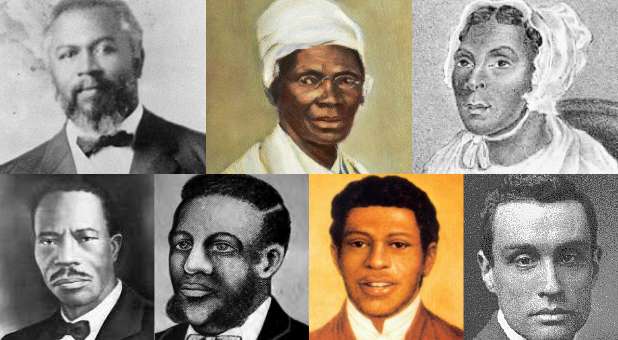Let’s Remember Our Black Faith Heroes—During Black History Month and Always
Kids around the nation are reminded every February of the legacy of Martin Luther King Jr., Harriet Tubman, Rosa Parks, Jesse Owens, Thurgood Marshall, Frederick Douglas and so many other Black men and women who excelled as politicians, civil rights leaders, judges, athletes and entertainers. But when we celebrate Black History Month, we often leave out the brave Black brothers and sisters who preached, prayed, planted churches and broke spiritual barriers.
Many Black people sacrificed their lives to spread the gospel of Christ—but their stories are often forgotten because we tend to focus on celebrities. I believe Black history is also my history, and yours, because the courageous pioneers included in the list below are part of God’s big and diverse family. As we honor Black heroes, I hope you will remember these seven men and women, no matter your racial background:
William “Daddy” Seymour (1870-1922): This humble holiness preacher helped birth the modern Pentecostal movement at a time when Blacks and whites rarely worshiped together. The Holy Spirit was poured out on Seymour’s meetings, held in a rented building on Azusa Street in Los Angeles beginning in 1906. Mixed-race crowds began attending the services, but locals viewed the whole scene with disdain. Yet in that humble place, where there was no pulpit and people sat on crude benches, a global revival began that has touched countless millions. Seymour, who was blind in one eye, marveled at the fact that all races worshiped together at Azusa. He said, “The color line was washed away in the blood.”
C.H. Mason (1864-1961): Healed from tuberculosis as a teenager, Mason began his ministry in Baptist churches in Arkansas and Mississippi. But in 1907, he ventured to Los Angeles to investigate what was happening at the Azusa Street Mission. He had a powerful experience with God and saw a glorious light that enveloped him. He wrote, “My language changed and no word could I speak in my own tongue. Oh! I was filled with the glory of the Lord.” He eventually established the Church of God in Christ in Memphis, Tennessee, and it grew to a network of 4,000 churches before his death. Today, COGIC’s worldwide membership has grown to more than 8 million.
Lott Carey (1780-1828): Born a slave in Virginia, Carey joined a mixed-race Baptist church in Richmond that had been swept up in the revivalist fervor of the Second Great Awakening. He learned to read the Bible and was able to save enough money to purchase his freedom. He eventually joined a movement of free Blacks who desired to return to Africa to a life without racism. Carey became the first Black foreign missionary sent from America. He planted a church in Liberia and eventually became its governor.
John Stewart (1786-1823): Born to free Black parents in Virginia, Stewart experienced a powerful conversion after struggling with alcoholism. He launched the first Methodist mission to the Indians of the United States, focusing his efforts on the Wyandotte tribe of northern Ohio. His message to his audience was, “Flee the wrath to come.” His singing and preaching resulted in the conversions of several tribal chiefs before he died at age 37.
Jerena Lee (1783-1864): After her conversion, this outspoken daughter of slaves felt God calling her to preach. Some African Methodist Episcopal clergy told her women couldn’t speak for God. Her reply: “If the man may preach, because the Savior died for him, why not the woman, seeing He died for her also?” She was eventually authorized to preach by Richard Allen, founder of the AME church. She traveled thousands of miles on foot to spread the gospel and was the first Black woman in this country to publish an autobiography.
Sojourner Truth (1797-1883): Belle Baumfree was born a slave. After she married and had five children, she escaped from slavery and later fought a legal battle to win her oldest son’s freedom. She became one of the first Black women in U.S. history to win a court case against a white man. Eventually she had a dramatic conversion and changed her name to Sojourner Truth. She then felt God calling her to become a preacher, and she became an outspoken activist for women’s rights, prison reform and the abolition of slavery. She felt it was wrong to fight for abolition and not women’s suffrage at the same time. She said, “If colored men get their rights, and not colored women theirs, … the colored men will be masters over the women, and it will be just as bad as it was before.”
Thoro Harris (1874-1955): The son of a Black doctor and a white woman, Harris is known today as one of the most prolific hymn writers of the early 20th century. In 1921, he wrote the song, “Jesus Loves the Little Children,” which has been sung in countless Sunday schools of all denominations. It says: “Jesus loves the little children/ All the children of the world/ Red and yellow, black and white/ They are precious in His sight.” He published countless songbooks used by early Pentecostals, and he was welcomed in both Black and white churches in a time of racial disunity.
These men and women are not just heroes of the Black church. They fought for freedom. They tore down walls of injustice. They were persecuted so we could experience the Holy Spirit’s liberty. Their legacy is ours to honor and preserve. {eoa}
Read articles like this one and other Spirit-led content in our new platform, CHARISMA PLUS.














































